Your DNA holds an encyclopedia of knowledge about you. It can reveal where your ancestors came from, what traits you’ve inherited from them, and how your genes affect your health. With so many DNA testing services available, accessing this knowledge has never been easier.
Two companies that have been dominating this market are MyHeritage and 23andMe. They share many similarities — they are both direct-to-consumer testing services that offer ancestry and health reports. Still, they also have many differences, some of which may be deal breakers for you.
You can find out about them in our comprehensive MyHeritage vs. 23andMe review. We’ll examine the two services, their reports, and security practices and break down their perks and limitations to help you make an informed choice.
MyHeritage vs. 23andMe: Exploring the basics
Before we compare 23andMe and MyHeritage in-depth, here’s a brief rundown of their services:
*Refers to ancestry analysis — health analysis may not be available in all countries.
MyHeritage: DNA analysis with advanced genealogy tools
Founded in 2003, MyHeritage is a long-standing, internationally popular DNA testing service. It’s also known for its convenience — you order your kit, complete an at-home cheek swab test, and mail it back. MyHeritage will read your data using autosomal DNA analysis and help you learn about your ethnic background, relatives, and genetic health.
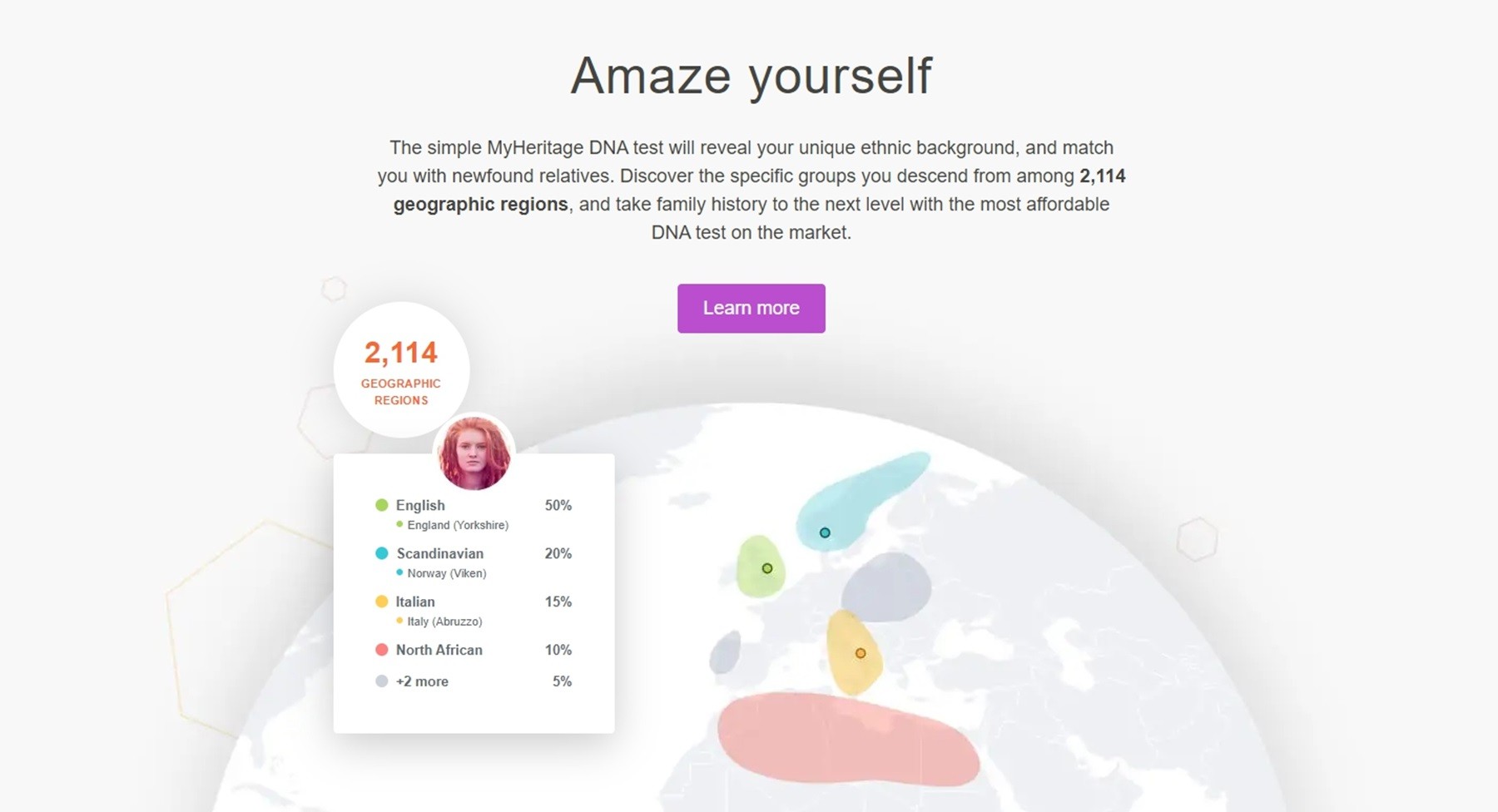
Source: MyHeritage
Still, MyHeritage is best known for its genealogy service. It hosts an array of tools to help take your family history research to a new level. Those include:
A searchable database of over 20 billion historical records
Family tree building on a private site
Alerts for new connections and records
Photo restoration
Bonus read: Check out how MyHeritage stacks up against Ancestry.
23andMe: DNA analysis with deep ancestry information
Compared to MyHeritage, 23andMe’s testing process is not as straightforward as it requires collecting a saliva sample before mailing it to the lab. Depending on the plan, the results may include ethnicity estimates, DNA matches, and health-related information. Apart from that, this testing service can also give you insight into your genetic traits, such as eye color and optimal wake-up time.
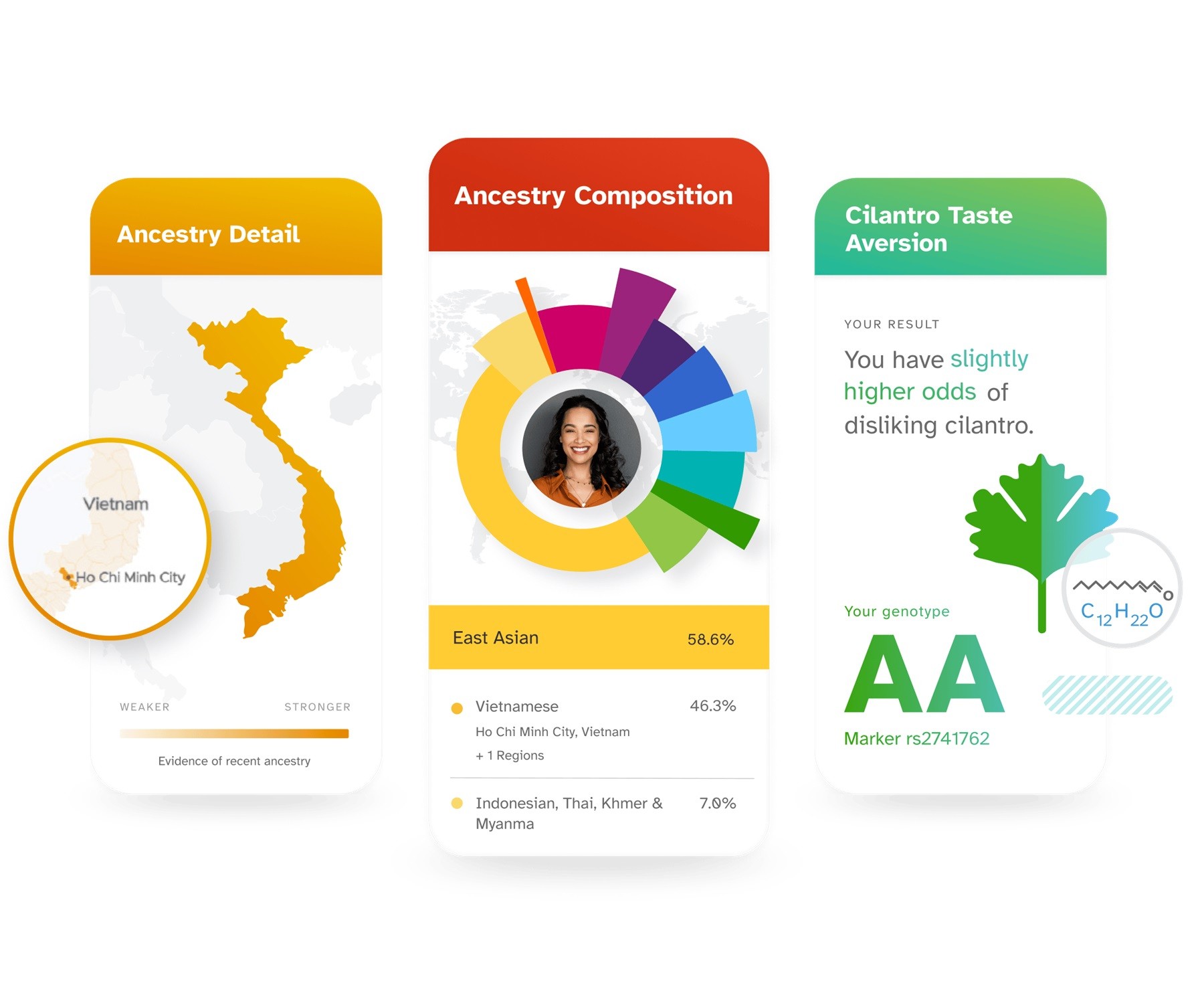
Source: 23andMe
That said, 23andMe has a more thorough approach to ancestry analysis than MyHeritage, allowing you to discover your ancient ancestors and haplogroups — genetic populations with which you share a common ancestor on your paternal or maternal side.
23andMe doesn’t have as many genealogy features as MyHeritage, though. It offers family tree building but lacks a historical record database.
Bonus read: See how 23andMe compares to other testing services:
23andMe vs. MyHeritage: A deep analysis
We’ve examined the two services in great detail to help you decide on the best option. For your convenience, we’ve organized the information based on seven key factors:
Size and geographical coverage of the database
Depth and quality of ancestry reports
Depth and quality of health reports
Sample collection process
Pricing options and value for money
Data security and privacy
User experience and reviews
1. Size and geographical coverage of the database
23andMe offers a larger database and more comprehensive coverage — the service compares DNA samples against people from 47 populations and over 3,000 regions. In comparison, MyHeritage currently covers 42 ethnicities and 2,114 regions and contains around 8 million, compared to 12 million DNA records of 23andMe.
Due to the slightly bigger database and coverage, 23andMe may produce more accurate and specific estimates and a greater number of relative matches. Still, their user bases differ, with MyHeritage being popular in Europe and 23andMe in the U.S., and the results may reflect this difference.
2. Depth and quality of ancestry reports
MyHeritage’s test relies on autosomal DNA analysis and looks at the first 22 pairs of your chromosomes. It targets select markers of your DNA, which can reveal your ancestors from about 10 generations into your past.
In comparison, 23andMe reads your autosomal DNA, Y-DNA, and mtDNA to provide haplogroup information. It can trace your heritage from as far back as 50 generations, including migration patterns. Y-DNA analysis will target your paternal-line ancestors, while mtDNA will target your maternal line.
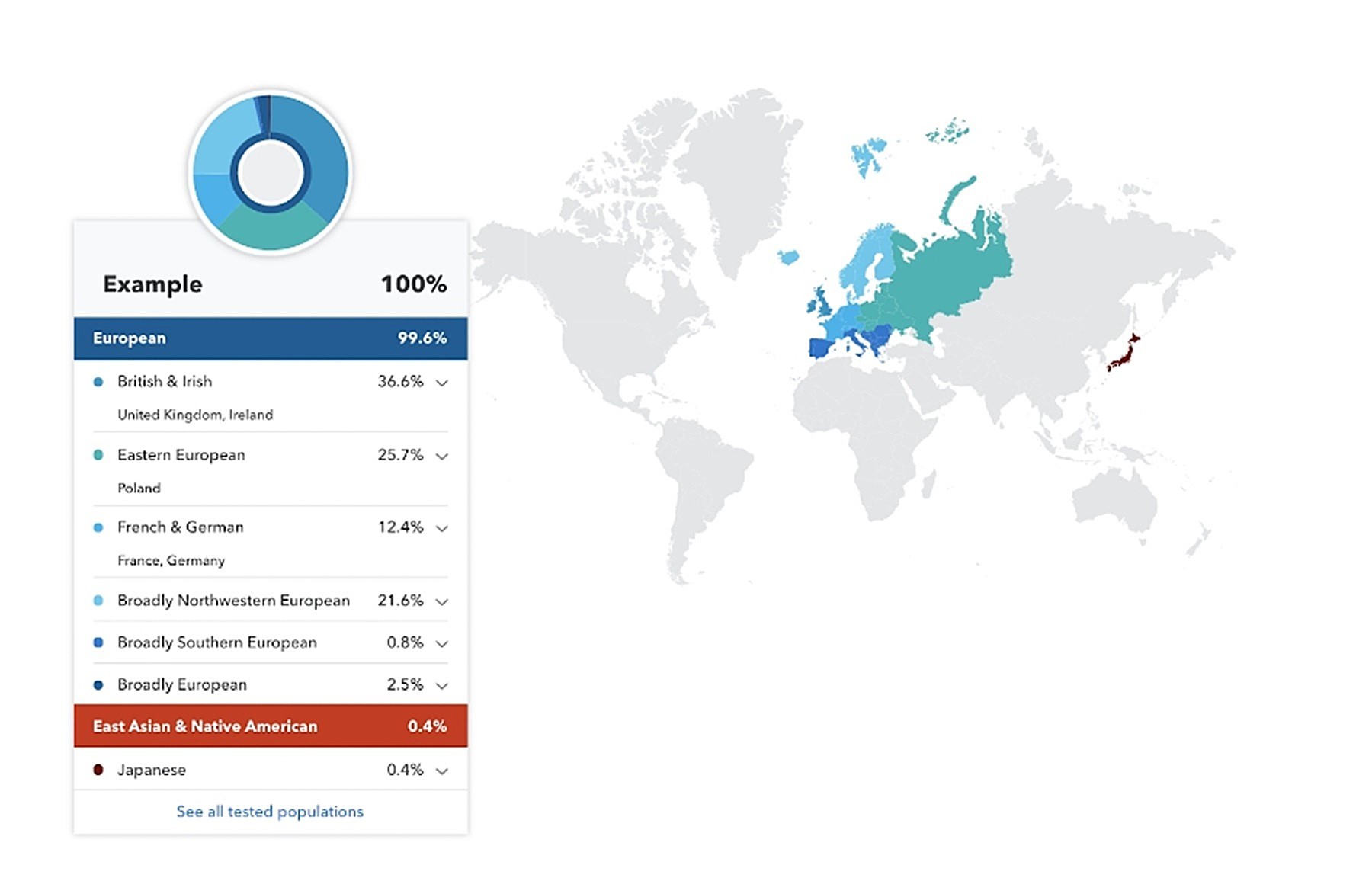
Source: 23andMe
When it comes to accuracy, 23andMe is generally more accurate at estimating ethnicity for most users, especially those in the U.S., as it has a larger reference population to compare your DNA. In contrast, MyHeritage has a big user base outside the U.S., especially in Europe, and may produce more precise estimates for users in these regions.
Some MyHeritage users suggest that the platform’s analysis of genetic groups — the regions your ancestors come from — may be more reliable. The results come with confidence levels instead of percentages to help you gauge the accuracy and interpret them realistically.
Here’s what one reviewer said about the feature:
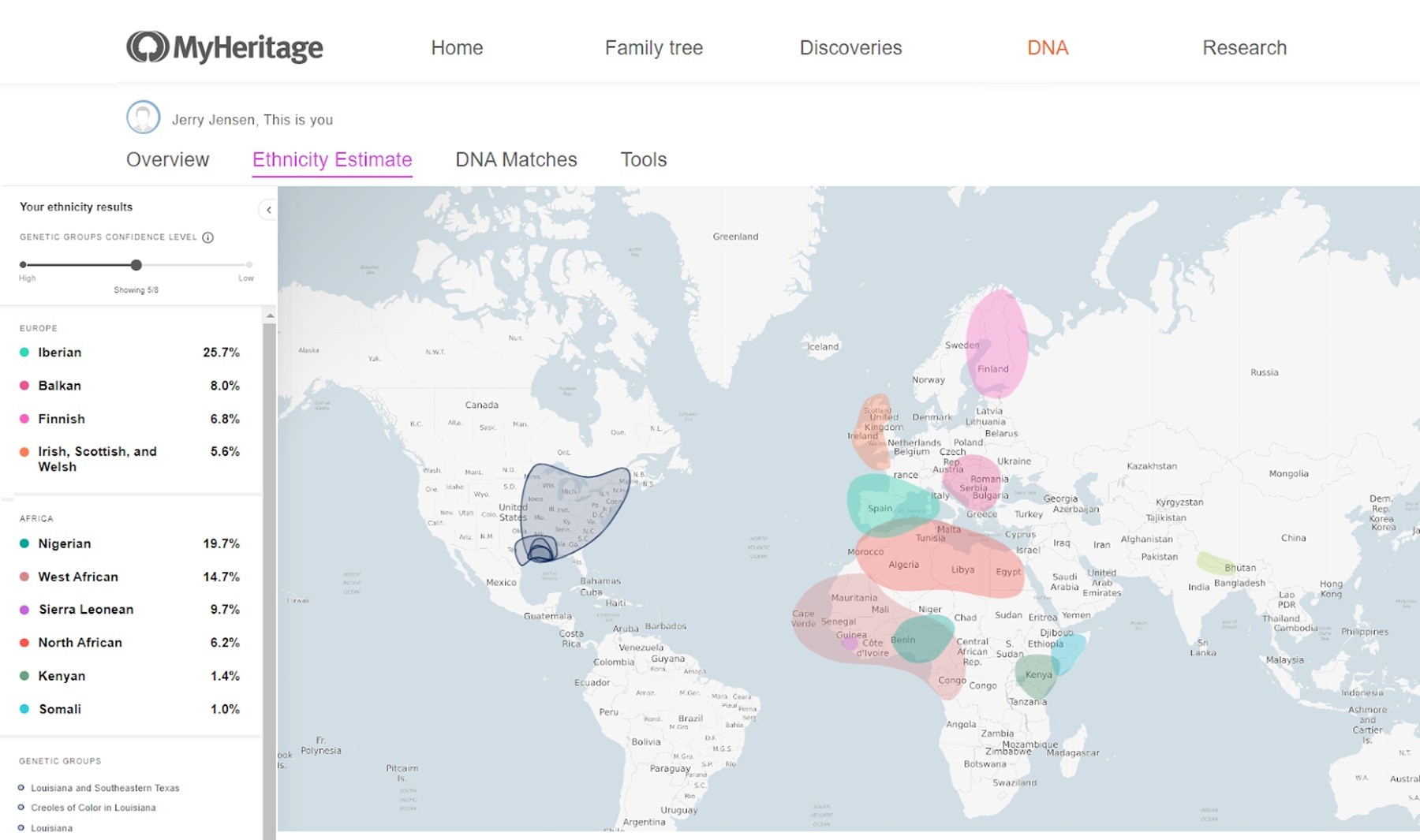
Source: MyHeritage
3. Depth and quality of health reports
Both DNA testing services charge extra if you want to receive health reports alongside ancestry. The MyHeritage Health Upgrade produces 27 reports, including genetic risk reports for diseases such as Parkinson’s, type 2 diabetes, and sickle cell anemia.
23andMe’s health analysis is slightly more advanced and comprehensive. Depending on your chosen plan, 23andMe can deliver 150–190+ reports related to disease predispositions, carrier status, wellness, family health history, and pharmacogenetics.
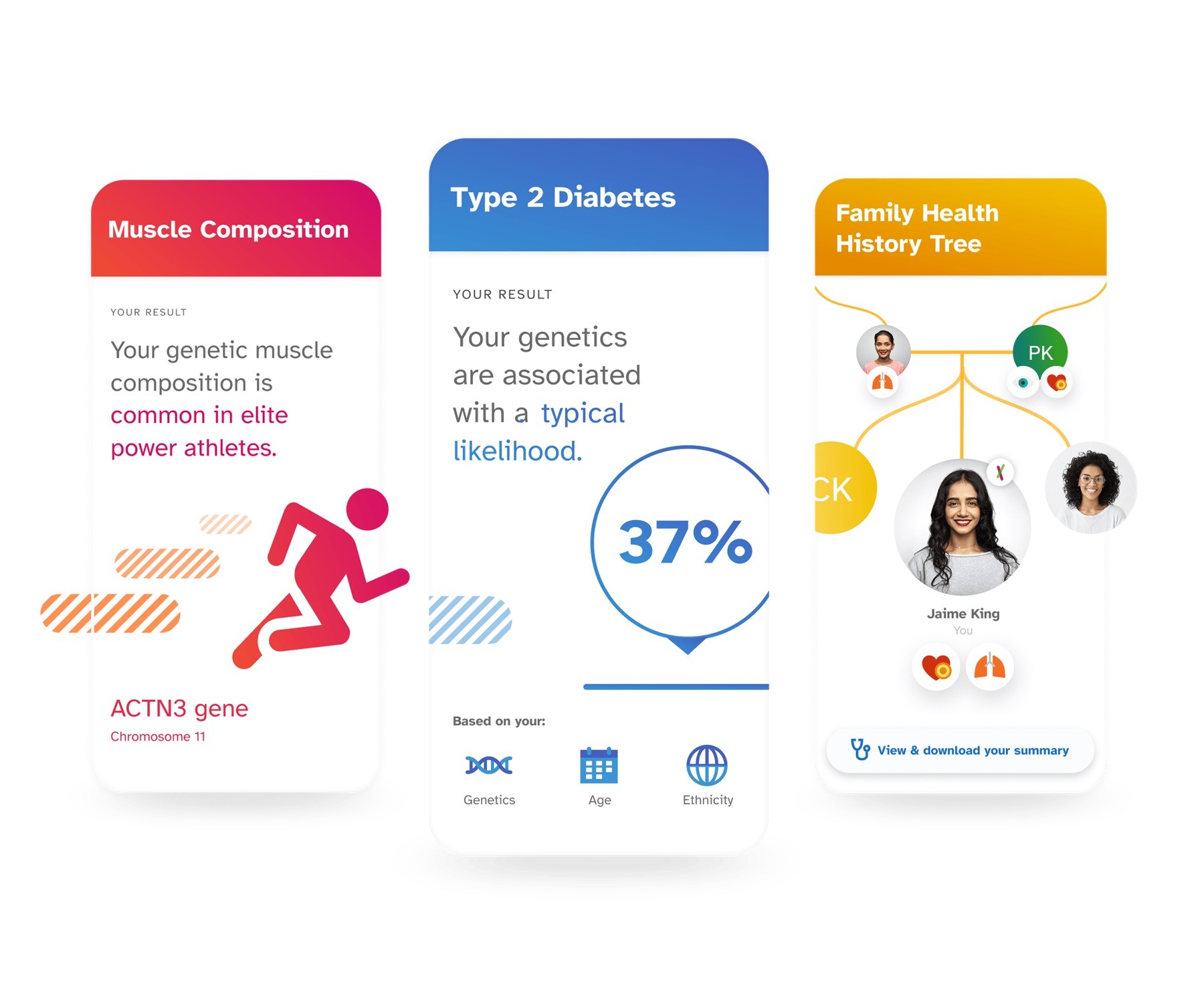
Source: 23andMe
That said, both testing services rely on limited genotyping technology, which analyzes only a small subset of your DNA, so you shouldn’t take these results at face value.
23andMe offers exome sequencing technology with its higher-priced tier, but this approach still examines only your exomes — the protein-coding elements of your genes. Though more advanced than genotyping, this method is still limited as it doesn’t capture your full genetic information, potentially missing key insights derived from the non-coding part of your DNA.
Tip: To get a more comprehensive analysis of your genetic health, risks, and traits, choose a platform that uses whole-genome sequencing technology. Nucleus is a physician-ordered test that analyzes close to 100% of your DNA to detect even the rarest genetic variants (unique differences in your DNA) influencing your health.
4. Sample collection process
While both tests require DNA samples from your mouth, MyHeritage offers a simpler solution as you only need to rub the inside of your cheek with the provided swab to get the sample.
With 23andMe, you need to provide a saliva sample by producing enough to reach the line of the included tube. Besides being slightly more complex, 23andMe’s saliva test may be difficult for users who experience dry mouth.
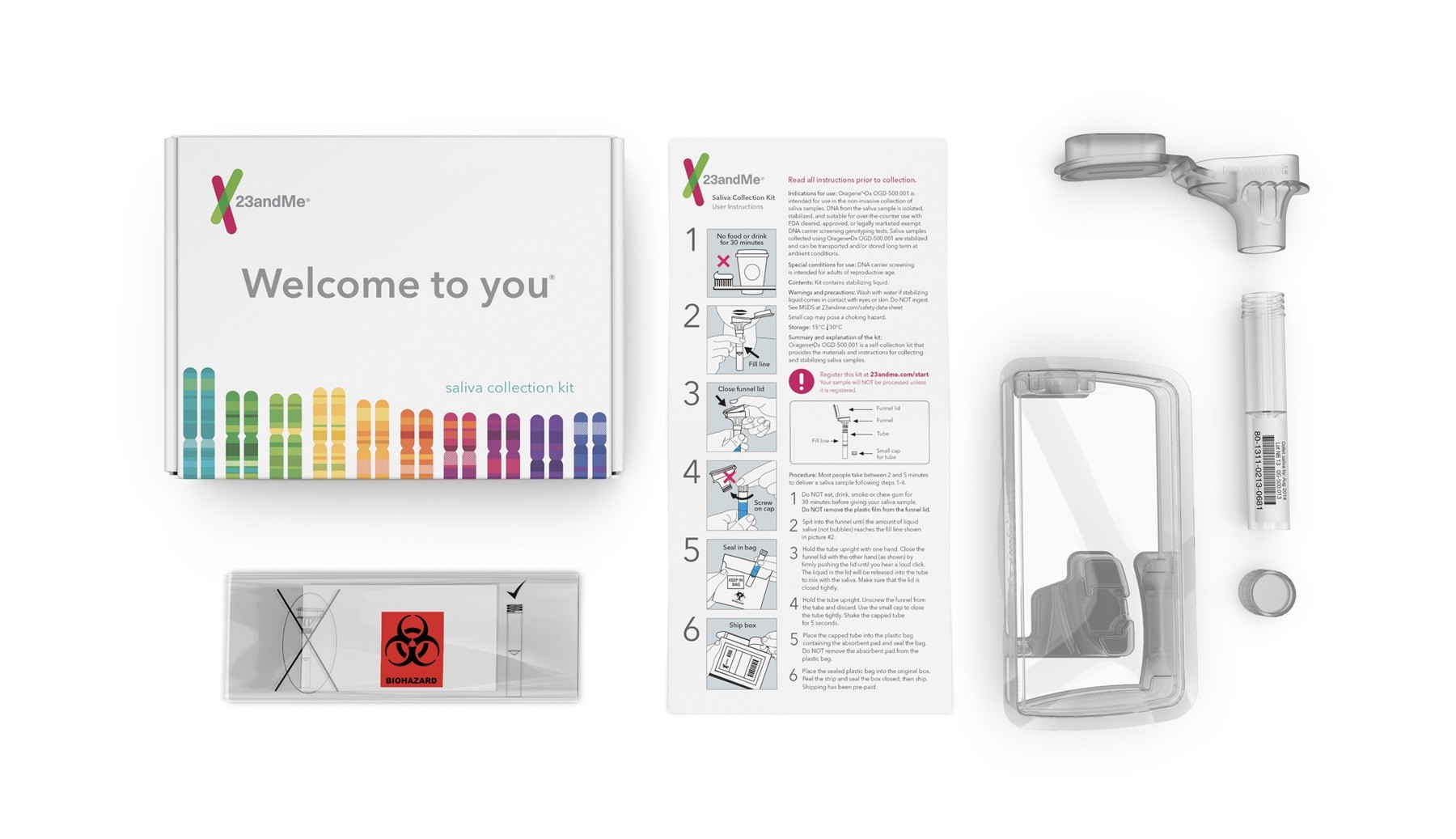
Source: 23andMe
Once you send in your sample, you should get the results within three to four weeks with both platforms. Keep in mind that delays are possible, especially during the holiday season.
Bonus read: Explore health-focused DNA testing services through our reviews:
5. Pricing options and value for money
Check out how much the two testing services charge for ancestry and health analysis (as of September 2024):
*MyHeritage prices exclude shipping costs.
The MyHeritage DNA test is more affordable and currently comes with free one-month access to its full list of genealogy features, after which it comes up to $94 a year.
23andMe’s base kit includes ancestry and trait reports, DNA matches, and family tree building. The premium plans are on the pricier side. Though they include many benefits, some platforms offer more advanced features for less.
6. Data security and privacy
Although neither platform is HIPAA-compliant, they claim to be transparent and never share data with any third parties while taking industry-standard measures to keep your data safe.
Despite the precautions, MyHeritage and 23andMe suffered severe data breaches — in 2017 and 2023, respectively, resulting in leaks of around 92 million login credentials and around 7 million user data points.
7. User experience and reviews
Customer reviews are mixed for both platforms. See how customers have rated 23andMe and MyHeritage on popular review sites (as of September 2024):
MyHeritage receives a lot of praise for its intuitiveness and clean design. As it allows DNA file uploads, many customers use MyHeritage for record-keeping, even when using another platform’s test kit.
In contrast, 23andMe doesn’t cater to genealogists, but the customers enjoy its extensive reports and find its ancestry insights generally more accurate than those of MyHeritage.
Both platforms receive many complaints regarding the quality of their services, with the most common ones relating to delayed turnaround and unresponsiveness of customer support.
Final thoughts on the MyHeritage vs. 23andMe comparison
If you’re interested in deep ancestral analysis, especially if you’re located in the U.S., 23andMe could be the better choice. Still, MyHeritage may be more suitable if you’re looking for matches outside the U.S. or if you’re a genealogy enthusiast who needs a user-friendly platform to document your research.
When it comes to health insights, neither platform can provide a complete and accurate representation of your genetic health, not even with the highest tier. For a more detailed and precise look into your genetic health, choose a physician-approved, whole-genome test — Nucleus Premium.
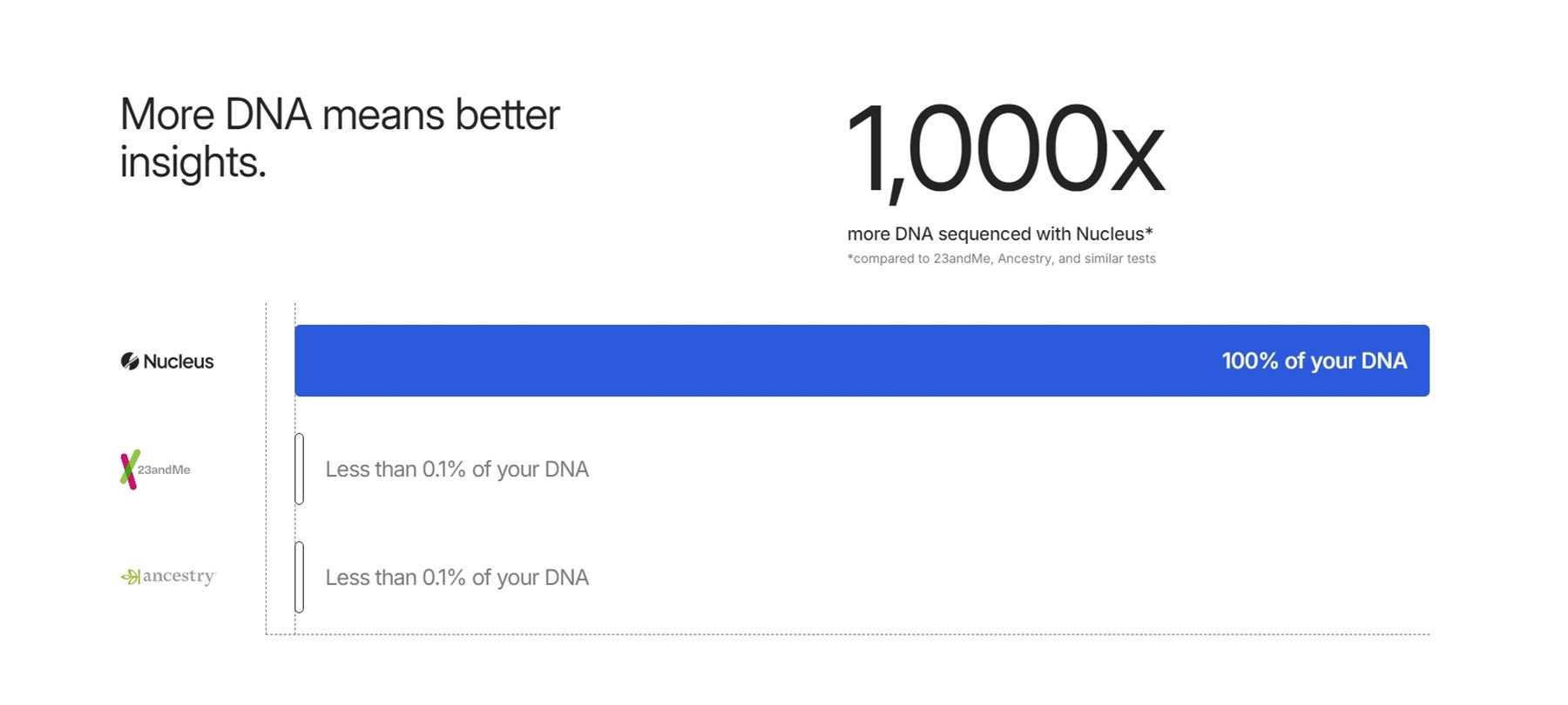
Source: Nucleus
Discover insights for a healthier and longer life with Nucleus
With its affordable at-home testing kit, Nucleus aims to revolutionize personal genomics by sequencing nearly 100% of your genome, targeting even the rare variants that genotyping tests miss. Nucleus also accounts for non-genetic factors like your BMI, age, and lifestyle to produce tailored and accurate reports.
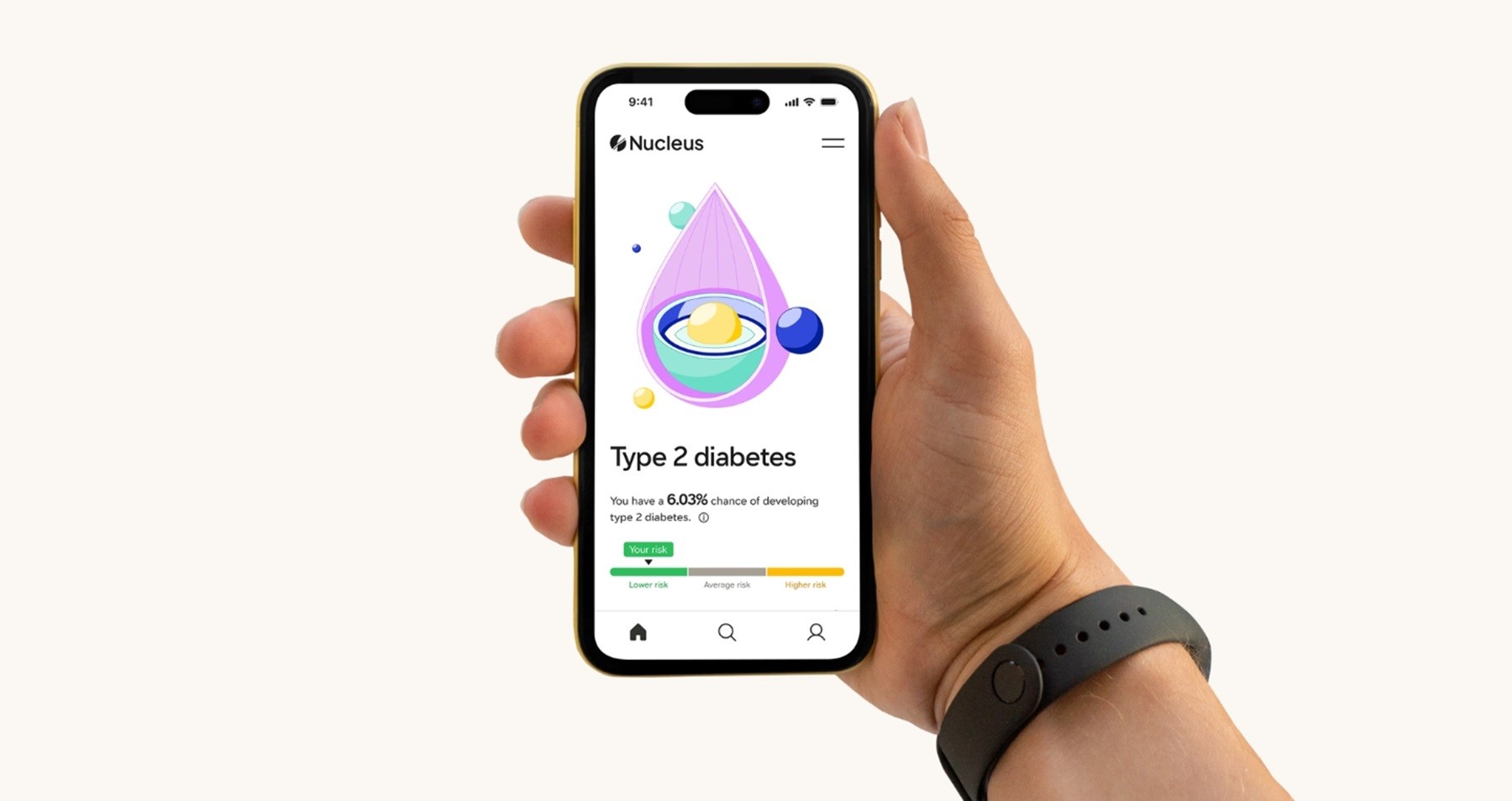
Source: Nucleus
Currently, you can get reports for over 170 diseases, such as cancers, including rare ones, neurological diseases, heart diseases, and five different mental health conditions.
The reports will give you actionable insights to help you detect risks early and start taking proactive measures. To connect you with a genetic counselor in case you have any concerns, Nucleus has partnered with SteadyMD, letting you get a professional opinion before taking further steps.
Nucleus is fully regulated and adheres to the highest quality and privacy standards. It’s HIPAA-compliant, and its labs hold CLIA and CAP certifications, so you can rest assured your samples and data will be handled with utmost care.
How Nucleus works
Once you place an order online, your Nucleus Premium kit should arrive within a few days. The sample collection process is simple — you swab your cheeks and mail the samples to the lab. Your results should be ready in around six to eight weeks, and you’ll receive them in the easy-to-use online portal.
Nucleus Premium costs [PRICE.KIT_SOLO.ONE] and provides you with all available health reports. The plan also includes access to updated reports based on new research and changes in your lifestyle and risk factors.
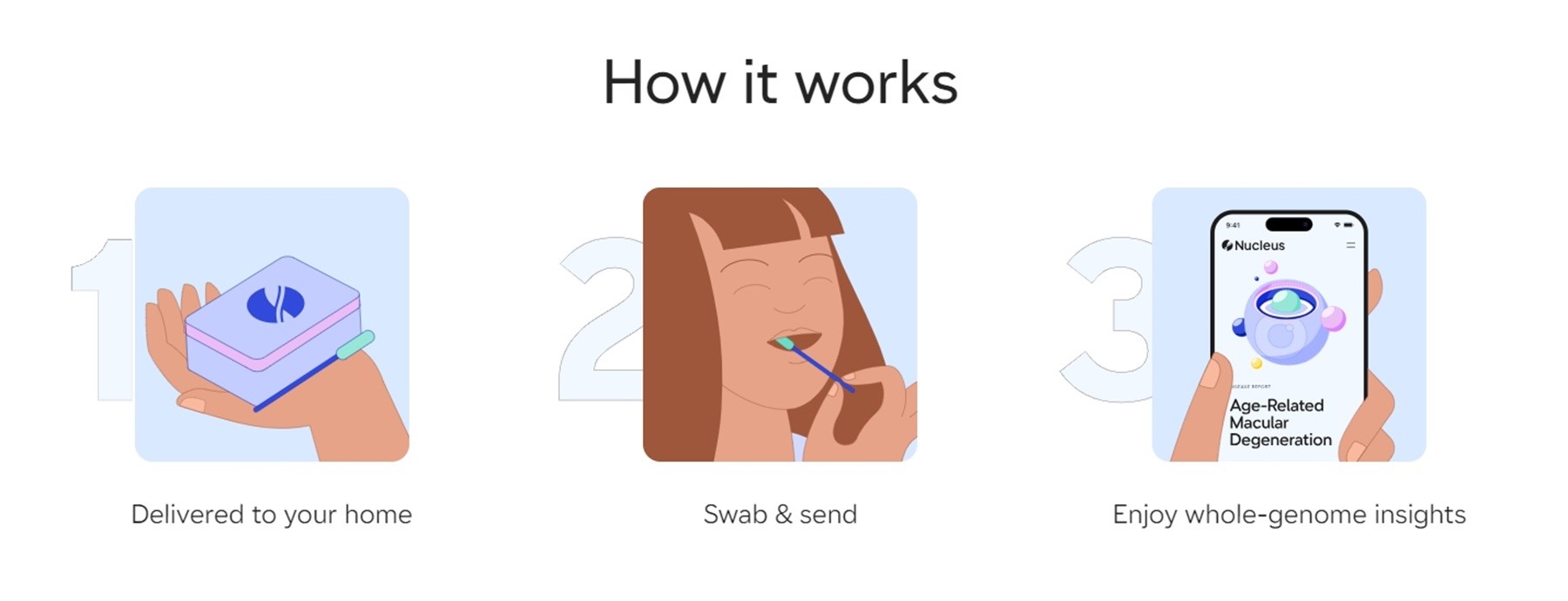
Source: Nucleus
How to get started with Nucleus
Here’s how you can get your Nucleus Premium kit and secure better ownership of your health:
Provide your personal information
Order Nucleus Premium
You may also like
We have many other comparisons and reviews you can read:
Featured image source: qimono












